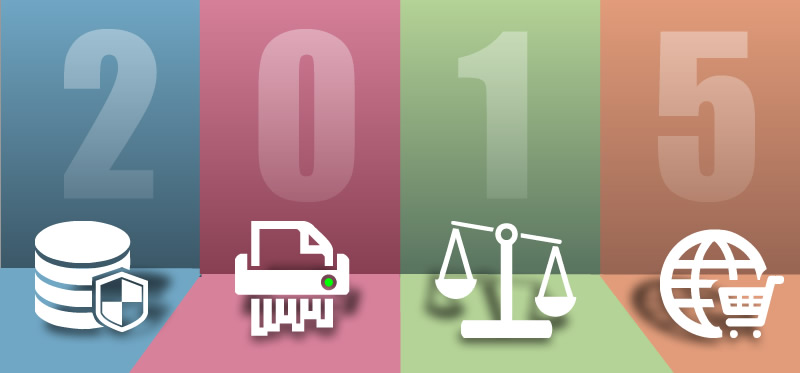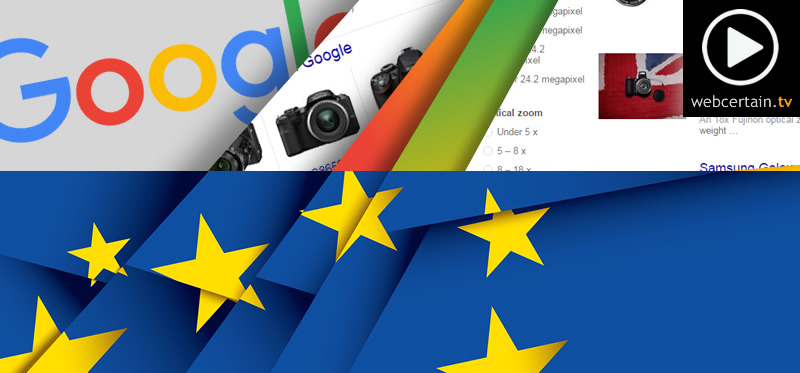It’s almost the end of 2015, which means it’s time to reflect on what’s happened in the world of international digital marketing during these last 365 days. There are some topics and stories which have been ever-present in the marketing news this year, which are important for international marketers to be aware of.
Data Protection
Data protection has become a big deal for internet companies this year.
People all around the world are becoming ever more wary about what sort of data companies have about them and how it’s being used.
The issue first popped up in the news in February, when the British data protection watchdog ruled that Google’s privacy policy was too vague and ordered the search giant to make improvements. Google’s privacy policy has been under scrutiny since March 2012 when the search giant made the decision to consolidate its 70 privacy policies into one.
Google wasn’t the only big name company to come under the spotlight. The social networking goliath Facebook came under fire from data protection regulators in Germany in August, when the social network was firmly told that it was not allowed to enforce its real-name policy in the country. German law says that German citizens have the right to use a pseudonym, and regulators also argued it was illegal for Facebook to ask to see users’ personal documents, such as their passports.
Facebook faced another blow later in the year from Belgium. In November, a Belgian court ordered Facebook to stop tracking users who are not members of the social network. The order related to a Facebook cookie that tracks the activities of anyone who visits the website, regardless of whether the person is logged in to the social network or not. The cookie gathers information such as which pages the user visits and how long they stay on each page. Belgian law says that this counts as “personal data” and that companies must have explicit permission from users before gathering such data – something that is not the case for non-members. In early December, Facebook reluctantly agreed to stop tracking non-users in Belgium, but made it clear that it was unhappy about having to do so.
A potentially more wide-ranging bit of news broke in October, when the Safe Harbour principle, which governs data transfers between the European Union and the US, was declared “invalid” by the European Court of Justice. The court ruled that that EU companies must take steps to ensure that US companies are taking data protection measures – something that had not been required before, as US companies could simply self-certify themselves as having data protection safeguards in place. The ruling shows a growing sense of caution and reluctance to believe that companies have the protection of their customers’ data close to their hearts.
In September, news from Russia highlighted how concerns about data protection can become warped and inverted and lead to online surveillance. The Russian government introduced a controversial new law that requires all companies that handle Russian citizen’s personal data to physically store this data within Russian borders. The move means that both Russian and international companies must store any relevant data in data centres in Russia.
Whatever your business, however large or small, complying with data laws for every country you operate in is essential. It may be the big global players in the news, but as internet users around the world become increasingly aware of their rights and laws becoming increasingly stringent, non-compliance isn’t worth the risk.
Google Anti-Trust Saga
Another long-running Google-based news story this year has been the EU anti-trust probe into the search giant. The EU is investigating Google over claims that it is deploying tactics to boost the ranking of its own services, whilst pushing rival services offered by competitors further down the search results by demoting the value of their links or simply refusing to list them altogether.
The EU originally told Google that it had to respond to these charges by 18th August, however, this was then extended by another month in order to give Google sufficient time to present its defence.
When Google did finally respond, it firmly said that it was not guilty of the charges because its search services are free. In a statement, the search giant said: “The [EU’s] objections fails to take proper account of the fact that search is provided for free. A finding of abuse of dominance requires a ‘trading relationship’ as confirmed by consistent case law. No trading relationship exists between Google and its users.”
But it didn’t stop there. In November, the Russian search company Yandex asked the EU to investigate Google for abusing its market position with its Android operating system. Yandex had previously complained to the Russian anti-monopoly regulator, who found Google guilty of “abusing its dominant market position” in the Russian mobile market and ordered the company to unbundle its search app from its Android operating system.
If the charges against Google are successful, the search engine may be forced to pay fines of up to 10% of its revenue, which could total as much as 6.6 billion US dollars.
This is good news for companies selling their goods online or in some other way competing with Google’s services. Google is now under significant pressure to drop this practice and create a more level playing field that will benefit smaller players and global brands alike.
Ecommerce and Mobile
Throughout the year we’ve been talking quite a lot about the rise of ecommerce, and in particular cross-border ecommerce. As internet users in developing markets get more comfortable being online, we’re seeing a consistent trend of them dipping their toes into online shopping. Cross-border ecommerce is a popular option as many countries see Western products as being of a higher quality than products made in other parts of the world.
Mobile is another area we have covered extensively. 2015 has been the year of “mobilegeddon” and a general shift in search engines’ attitudes towards seeing mobile as a more important part of the internet experience. With mobile phones being the main gateway to the internet in many markets, particularly developing markets, the power of mobile is clear. Several search engines, including Google and Yandex, have updated their ranking algorithms to give mobile-friendly websites a higher ranking than websites deemed as mobile-unfriendly. And the South Korean search engine Naver has gone even further, announcing in November that it was moving from a mobile-first to a mobile-only strategy.
International marketers would be wise to take these two trends into consideration when honing their digital strategies. Ecommerce websites should be friendly to overseas customers, offering payment options in their own currencies and pages written in their own languages. Webmasters need to ensure their websites are mobile-friendly, with responsive designs, large link buttons and easy-to-read font sizes all being necessary for mobile success.
Right To Be Forgotten
The “right to be forgotten” first burst onto the scene in May 2014, when the European Court of Justice ruled that EU citizens have the right to request that search engines remove links to webpages containing inaccurate or outdated information about them.
Since the law was introduced, Google has evaluated over 1.2 million URLs removal requests from EU citizens, with the search engine complying with 42% of these requests.
In a slightly bizarre twist, it has even removed links about removing links. In August, Google was ordered by the UK’s Information Commissioner’s Office (ICO) to remove links to articles about the “right to be forgotten” from its search results. The order specifically referred to a person who committed a “minor” crime 10 years ago, and subsequently had the links removed under the EU’s “right to be forgotten” law. However, this act of removal was then deemed newsworthy by British news websites, which published articles about the removal. These news articles then appeared in the search results when searching for the person’s name. It was these news links that were ordered to be removed.
In the last year, the “right to be forgotten” principle has shown all the signs of breaking out of the borders of the European Union, with Japan, China, Russia and the USA all seeming to flirt with the idea.
Perhaps most significant is China. In September, a Chinese comedian sued the Chinese search giant Baidu because a Baidu Baike entry about him allegedly contained incorrect, “defamatory” content. Baidu Baike is an online encyclopaedia similar to Wikipedia.
There is no doubt that the internet is becoming more transparent and internet users themselves are much more aware of their rights and willing to assert them. With only 42% of requests actually being actioned, and discord over the global removal of links, the debate on issue looks set to continue.
What will the big stories be in 2016? Check out webcertain.tv daily to keep up-to-date with the latest news from around the globe!










